The Intel Comet Lake Core i9-10900K, i7-10700K, i5-10600K CPU Review: Skylake We Go Again
by Dr. Ian Cutress on May 20, 2020 9:00 AM EST- Posted in
- CPUs
- Intel
- Skylake
- 14nm
- Z490
- 10th Gen Core
- Comet Lake
CPU Performance: Web and Legacy Tests
While more the focus of low-end and small form factor systems, web-based benchmarks are notoriously difficult to standardize. Modern web browsers are frequently updated, with no recourse to disable those updates, and as such there is difficulty in keeping a common platform. The fast paced nature of browser development means that version numbers (and performance) can change from week to week. Despite this, web tests are often a good measure of user experience: a lot of what most office work is today revolves around web applications, particularly email and office apps, but also interfaces and development environments. Our web tests include some of the industry standard tests, as well as a few popular but older tests.
We have also included our legacy benchmarks in this section, representing a stack of older code for popular benchmarks.
All of our benchmark results can also be found in our benchmark engine, Bench.
Speedometer 2: JavaScript Frameworks
Our newest web test is Speedometer 2, which is a accrued test over a series of javascript frameworks to do three simple things: built a list, enable each item in the list, and remove the list. All the frameworks implement the same visual cues, but obviously apply them from different coding angles.
Our test goes through the list of frameworks, and produces a final score indicative of ‘rpm’, one of the benchmarks internal metrics. We report this final score.
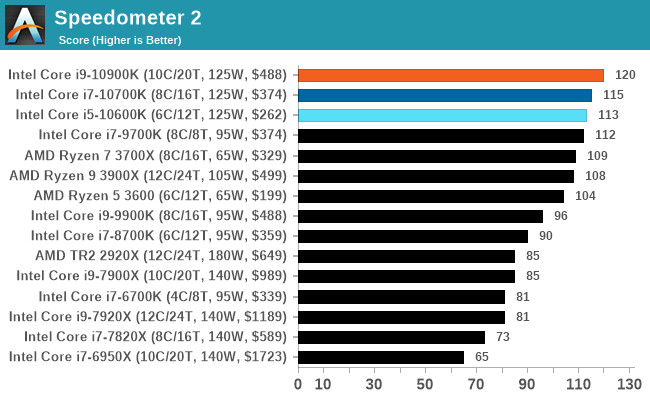
Google Octane 2.0: Core Web Compute
A popular web test for several years, but now no longer being updated, is Octane, developed by Google. Version 2.0 of the test performs the best part of two-dozen compute related tasks, such as regular expressions, cryptography, ray tracing, emulation, and Navier-Stokes physics calculations.
The test gives each sub-test a score and produces a geometric mean of the set as a final result. We run the full benchmark four times, and average the final results.
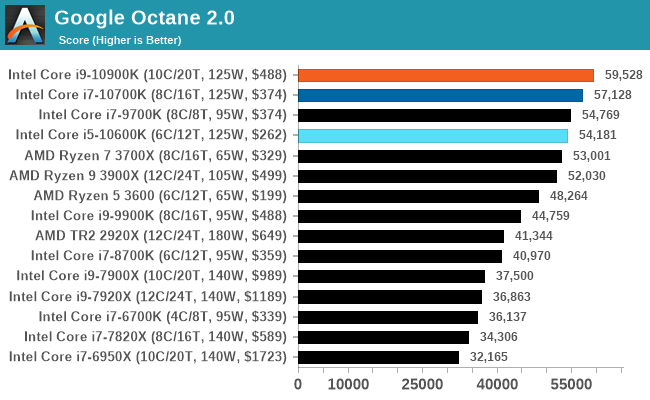
Mozilla Kraken 1.1: Core Web Compute
Even older than Octane is Kraken, this time developed by Mozilla. This is an older test that does similar computational mechanics, such as audio processing or image filtering. Kraken seems to produce a highly variable result depending on the browser version, as it is a test that is keenly optimized for.
The main benchmark runs through each of the sub-tests ten times and produces an average time to completion for each loop, given in milliseconds. We run the full benchmark four times and take an average of the time taken.
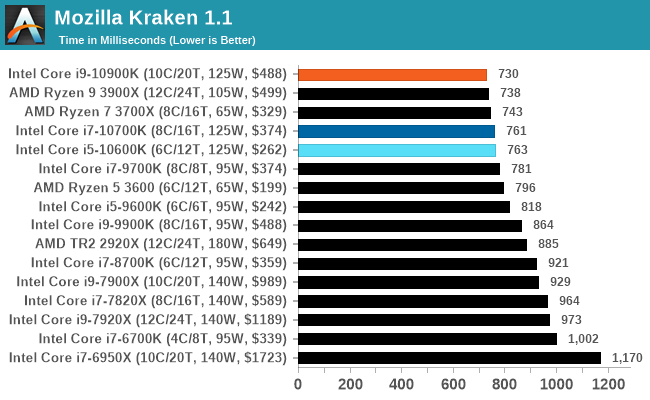
3DPM v1: Naïve Code Variant of 3DPM v2.1
The first legacy test in the suite is the first version of our 3DPM benchmark. This is the ultimate naïve version of the code, as if it was written by scientist with no knowledge of how computer hardware, compilers, or optimization works (which in fact, it was at the start). This represents a large body of scientific simulation out in the wild, where getting the answer is more important than it being fast (getting a result in 4 days is acceptable if it’s correct, rather than sending someone away for a year to learn to code and getting the result in 5 minutes).
In this version, the only real optimization was in the compiler flags (-O2, -fp:fast), compiling it in release mode, and enabling OpenMP in the main compute loops. The loops were not configured for function size, and one of the key slowdowns is false sharing in the cache. It also has long dependency chains based on the random number generation, which leads to relatively poor performance on specific compute microarchitectures.
3DPM v1 can be downloaded with our 3DPM v2 code here: 3DPMv2.1.rar (13.0 MB)
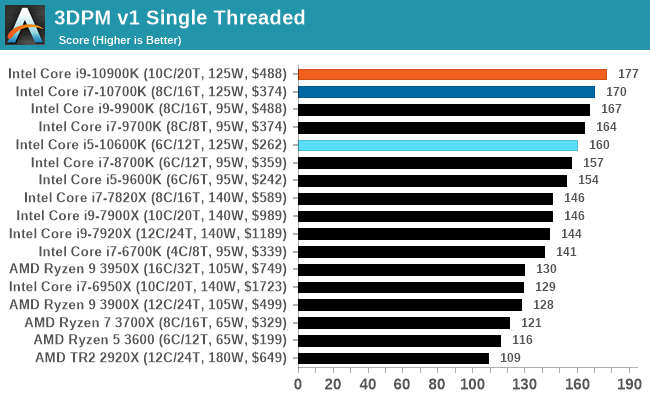
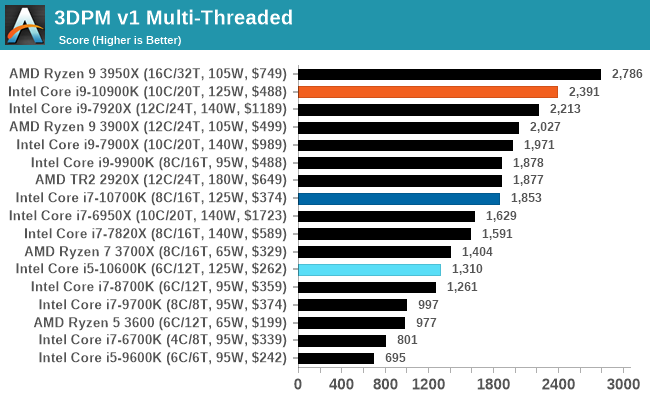
x264 HD 3.0: Older Transcode Test
This transcoding test is super old, and was used by Anand back in the day of Pentium 4 and Athlon II processors. Here a standardized 720p video is transcoded with a two-pass conversion, with the benchmark showing the frames-per-second of each pass. This benchmark is single-threaded, and between some micro-architectures we seem to actually hit an instructions-per-clock wall.
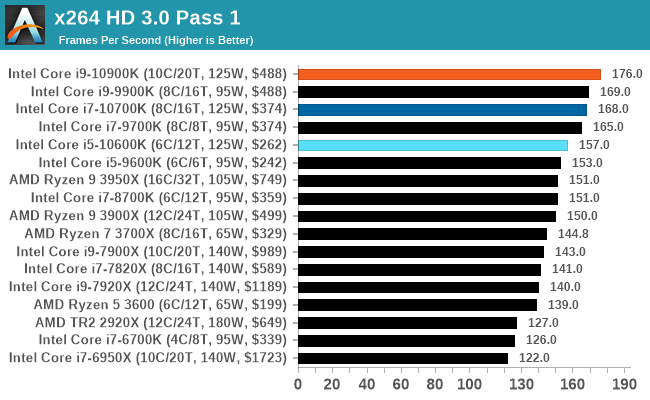
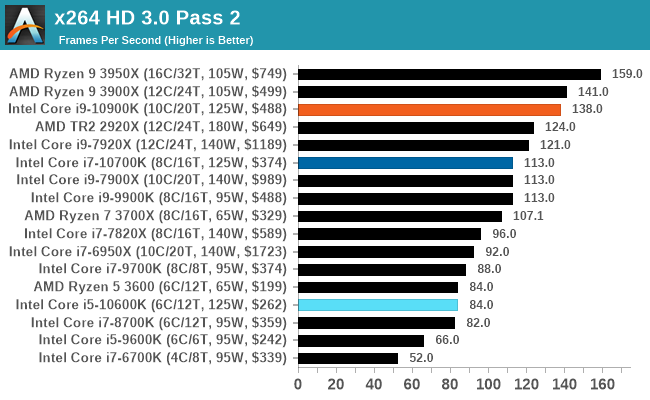










220 Comments
View All Comments
Spunjji - Tuesday, May 26, 2020 - link
Complaining at the reviewer for failing to test something that doesn't really get used is... a thing.Datawhite - Thursday, May 21, 2020 - link
Bring on ZEN 3 AMD than Intel can R.I.P. ......Still waiting for RDNA 2!
Samus - Thursday, May 21, 2020 - link
No quad core under $100 basically just gave AMD the entire budget segment.Overall, this pricing is ridiculous but at least the 6C parts are somewhat competitive.
ph1nn - Thursday, May 21, 2020 - link
Does Intel realize global climate change is a thing? This power consumption is an embarrassment, this company used to have the most most efficient CPUs now they draw 200W?!Gastec - Friday, May 22, 2020 - link
I don't understand what the climate change has to do with a 200W CPU power consumption. I would have understood something like "does Intel realize we have limited or non-existent incomes, given the current Pandemic situation?"Beaver M. - Friday, May 22, 2020 - link
I hope you buy a new PC only every 10 years.pegnose - Friday, May 22, 2020 - link
It looks to me that a simple re-ordering of the core-to-core latency chart for the 10900K removes the apparent 3-4 ns jump. You already mentioned that the core "names" not necessarily represent hardware positions, Ian.Btw, I am curious why it seems that a higher core/thread index comes with higher latency. Adjacent cores should have low core-to-core latency. But 16-to-18 takes longer than 4-to-6. Is this due to address-checking in the ring-bus communication taking longer for higher indices?
Shaquille_Oatmeal - Friday, May 22, 2020 - link
X570 chipset AMD boards can't be found in stock almost anywhere. This isn't news. But even today, days after Intel's 10th gen LGA1200 CPUs launched, and the arguably subjective reviews are finally made public, there's an endless supply of Z490 boards. PC enthusiasts do want the fastest CPUs, for sure, but we also consider the cost and [overall efficiency]. We are not 12 year old kids wanting the colorful RGB lights for our COD rig. No. The RGB lighting is a nice feature, but we're not idiots. These Intel CPUs are garbage based on even Intel's standards over the years; yet they are being marketed like they are the best CPUs. Intel, we can see the truth. And the truth is we won't touch these CPUs; perhaps if you dropped the price on the 10700K to $250 we can have a serious convo. Hopefully Intel gets there game together. I'm sure their OEM buyers are thinking the same.Gastec - Friday, May 22, 2020 - link
The way this is going I'm looking forward to that 32-core Intel consumer CPU, with 1000 W power draw, that will definitely give us those much needed 1000 fps @ 1080pboozed - Saturday, May 23, 2020 - link
Got a question about the game benchmarks. The table has an "IGP" column but the charts in that column have "GTX 1080" written on them. So which is it?